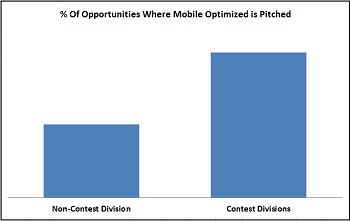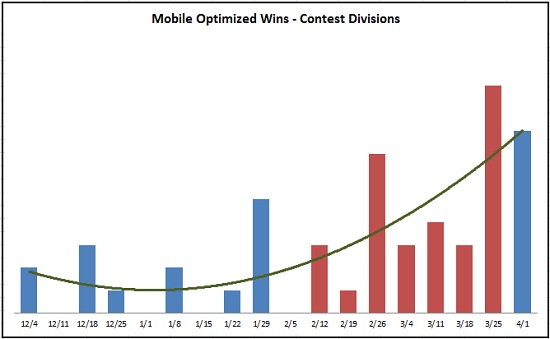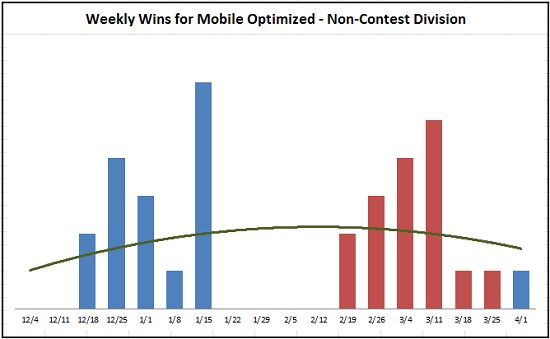When designing sales contests, sales managers often struggle with the following question…
“Should I motivate people to pitch this product and then trust it will result in more sales? Or, should I only motivate closing sales. After all, we get paid on sales – not pitches.”Since we now have our own sales contest app installed in our instance of Salesforce, we run internal contests all the time. It’s a chance to “be our own customer”, and we know this stuff works! Below is a case study on a recent internal sales contest completely focused on pitching a new product – a mobile optimized version of a client’s promotional website.
The Contest Setup
Contest Length: 6 weeks
Behavior Motivated: 1 point every time a salesperson pitched our mobile optimized product. This is a field we have on an Opportunity record which allows our contest app to track that behavior. This made it really easy for the sales team to know what to focus on – pitching mobile.
The Prize: Each point served an entry and at the end of the contest we randomly selected a winner across all entries within each division. The sales team with the most points got a team dinner worth $250.
Who Was Included: Our 100-person sales organization is broken up into three divisions. two of the divisions ran their own version of the contest, and each one was setup exactly the same way. The third division didn’t run a contest at all which served as a control group. This control group division was strongly encouraged to pitch and sell our mobile optimized product, but there was no contest around it.
Contest Updates: Using our sales contest app, each participating division could get a real-time leaderboard of their results within Salesforce. A leaderboard email was sent out multiple times per week, and there was also a private Chatter group with contest updates and trash talking. This way, salespeople would always know where they stand and what they need to do to climb the leaderboard.
Results Part 1: More Pitches & Improved CRM Adoption
 As expected, since we were rewarding people for checking the “pitched mobile optimized” box in an Opportunity record, the number of times that box was checked went up significantly. The graph on the right shows the percentage of Opportunities where the mobile optimized box was checked in the non-contest division versus the divisions that were running a contest.
As expected, since we were rewarding people for checking the “pitched mobile optimized” box in an Opportunity record, the number of times that box was checked went up significantly. The graph on the right shows the percentage of Opportunities where the mobile optimized box was checked in the non-contest division versus the divisions that were running a contest.
One could argue, however, that the salespeople in the non-contest division were pitching our mobile optimized product but just not checking the box. This is a good example of how a contest can help motivate adoption of your sales CRM tool.
Results Part 2: More Sales!
As a reminder, this contest was NOT rewarding people for closing Opportunities with our mobile optimized product included. Just for pitching it. Our belief was that this is a very strong product and if we pitched it more often, we would sell more. And that’s exactly what happened.
Below is a bar graph that shows the number of weekly sales where our mobile optimized product was included. The red bars are the weeks that the contest was running. You’ll notice the bar on the far right is blue, because we wanted to see wins after the contest ended since people were pitching the product during the last week of the contest as well. Check out that trend line!
Now here is the control group – the division that was encouraging the sales team to pitch our mobile optimized product more often, but there was no contest to motivate that behavior. That’s why you’ll still see the contest dates in the red bars below because that was the time period when the division was encouraging the pitches to happen. While there was an increase in activity during those initial four weeks compared to the previous few weeks, the number of wins was very similar to months prior, which the trendline helps display.
Conclusion
We will continue to keep an eye on these results as the expectation is that sales will continue well after the contest concludes. Not only will we see sales conversions from the pitches that occurred during the contest, but also the salespeople are now seeing this as a viable product and they want to pitch it more often. Check out our other blog post on that topic – Sales Contests: Quick Blip or Lasting Impact?
So what’s your opinion? Should contests focus only on making the sale, or the behaviors that lead to a sale?





